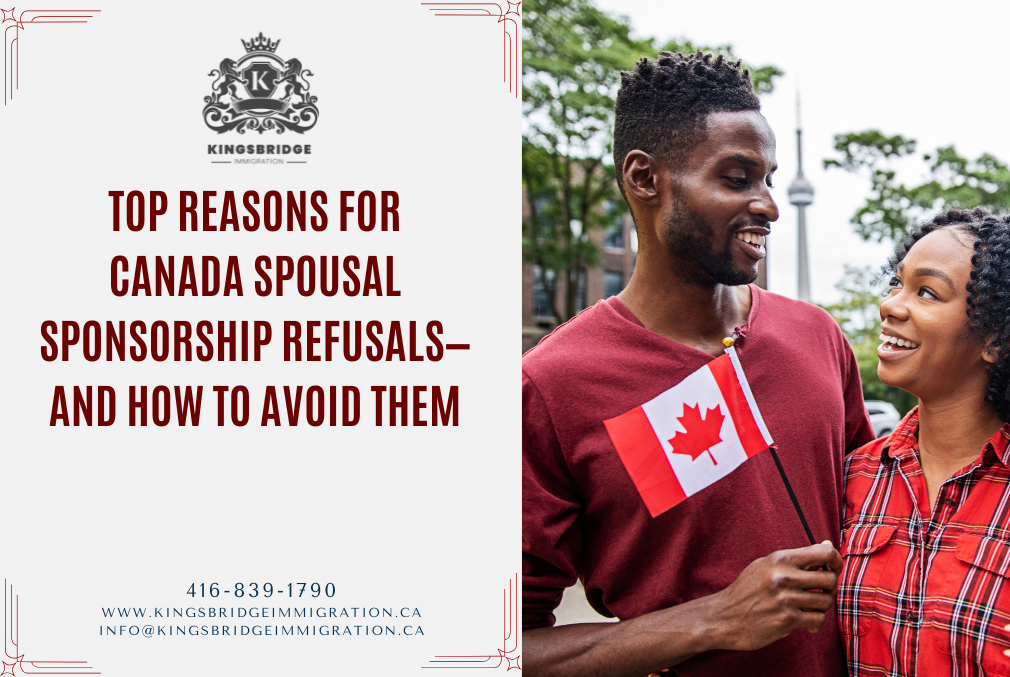
As per the Immigration Levels Plan 2023-2025, Canada aims to reunite over 240,000 couples via spousal sponsorship. While IRCC (Immigration, Refugees, and Citizenship Canada) has set a service standard of processing 80% of spousal sponsorship applications within 12 months, current processing times still reflect pandemic-related delays, with inland applications taking around 13 months and outland applications taking 16 months.
Spousal sponsorship is meant to help couples live together permanently in Canada, and it has no education or language proficiency requirements for spouses. However, to succeed, the application must demonstrate the genuineness of the relationship and include accurate documentation. Despite careful planning, many applications are still refused due to common, avoidable reasons.
Here are 10 major causes for spousal sponsorship refusals—and tips on how to avoid them:
1. Inadmissibility
Applications can be refused if the spouse is found inadmissible for criminal or medical reasons. For example, a conviction like a DUI in the spouse’s home country could result in criminal inadmissibility.
Tip: Ensure that both the sponsor and the applicant are clear of any criminal or medical issues before applying.
2. Lack of Genuine Relationship
If IRCC suspects that the relationship is not genuine or was entered into solely for immigration purposes, the application may be denied. This is one of the most common reasons for refusal.
Tip: Provide ample evidence of your relationship—such as photos, communication records, and shared financial responsibilities. Be thorough in demonstrating that your relationship is real and ongoing.
3. Misrepresentation
Providing incorrect information, whether intentional or accidental, can lead to an application being refused for misrepresentation. Even small errors in dates or details can result in denial.
Tip: Double-check all information before submitting the application, and be cautious if you are working with an agent—ensure they do not submit incorrect information on your behalf.
4. Insufficient Supporting Documents
If you fail to provide enough documentation, such as marriage certificates, photos, or proof of joint finances, your application could be denied. Even slight inconsistencies between documents can lead to suspicion of forgery.
Tip: Submit comprehensive and consistent paperwork that clearly demonstrates your relationship’s validity. Make sure documents are genuine and free from errors.
5. Unsatisfactory Financial Support
Sponsors must prove they can financially support their spouse. Inadequate proof of income or financial stability could result in a refusal.
Tip: Provide clear evidence of your financial situation, such as recent pay stubs or bank statements. Remember that the sponsor has a three-year financial obligation towards their spouse.
6. Inconsistent Answers in Interview
If the immigration officer calls the sponsored spouse for an interview, providing inconsistent or vague answers could result in refusal.
Tip: Be well-prepared for the interview, ensuring you know key details about your spouse and relationship. Consistency and accuracy are critical.
7. Failure to Declare Dependents
Failure to declare all dependents, including non-accompanying family members, can lead to a refusal.
Tip: Accurately declare all dependents on your application and ensure your financial resources can support them.
8. Proof of Residency
Sponsors must be Canadian citizens or permanent residents residing in Canada to apply. Inadequate proof of residency could lead to refusal.
Tip: Ensure you have sufficient documentation proving your residency status in Canada, such as utility bills or lease agreements.
9. Previous Sponsorship Defaults
If the sponsor has previously defaulted on a sponsorship commitment, they may be ineligible to sponsor again.
Tip: Confirm that any previous sponsorship obligations have been fulfilled and that you are eligible to sponsor your spouse.
10. Incomplete Application
An incomplete application, unpaid fees, or missing information can result in automatic refusal.
Tip: Carefully review the application before submission. Make sure all forms are complete, all necessary fees are paid, and all required information is provided.
By avoiding these common pitfalls and ensuring your application is thorough and accurate, you can improve your chances of success. If you’re unsure about any part of the process, consider consulting an immigration expert for guidance.
At Kingsbridge Immigration, we ensure your application is presented with the utmost care, helping you avoid common pitfalls and increasing your chances of success.
